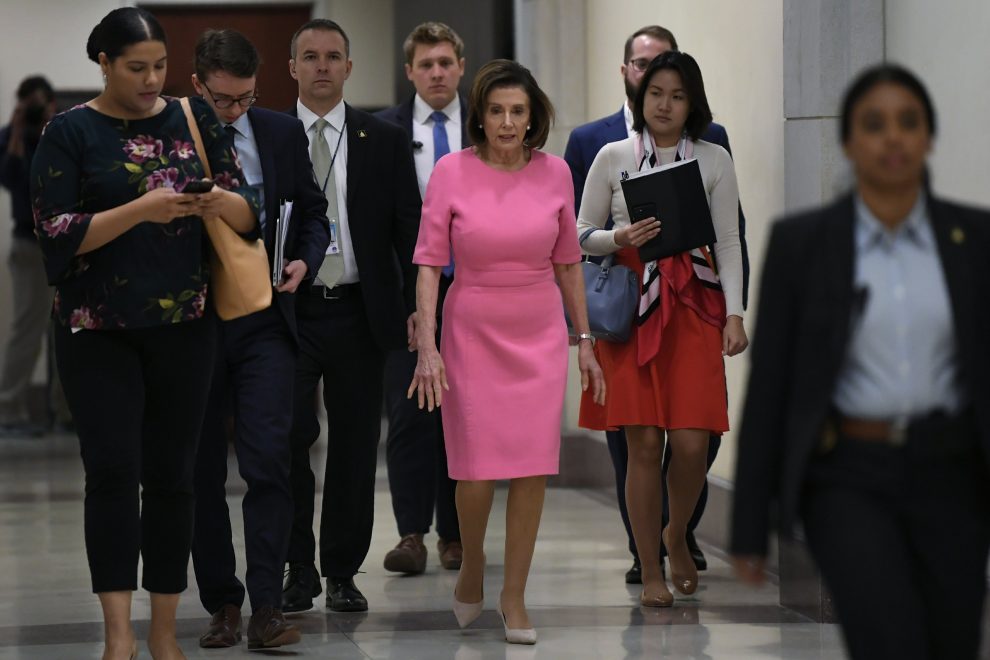House Democrats on Thursday approved a massive, $2.2 trillion package of coronavirus relief, lending political cover to party centrists in tough races while putting fresh pressure on Senate Republicans to move another round of emergency aid before the coming elections.
The vote arrived only after last-ditch negotiations between Speaker Nancy Pelosi (D-Calif.) and Treasury Secretary Steven Mnuchin on Thursday failed to yield a bipartisan agreement — and it sent a signal that the prospects for such a deal before Nov. 3 have dimmed considerably.
The bill was approved by a tally of 214 to 207, but to secure passage, Pelosi and her leadership team had to stave off a late revolt from a surprisingly large number of centrists who were furious that Pelosi had staged a vote on a bill with no chance of becoming law.
As the vote clock ticked down, Pelosi was seen on the chamber floor huddled in a long and animated conversation with three of those moderates: Reps. Josh Gottheimer (D-N.J.), Dean Phillips (D-Minn.) and Jason Crow (D-Colo.). Watching closely were Reps. James Clyburn (S.C.), the Democratic whip, and Steny Hoyer (D-Md.), the House majority leader.
Afterwards, Gottheimer and Crow voted in favor of the measure, while Phillips voted against it, bringing the number of Democratic defections to 18. The vote was gaveled closed shortly afterwards.
“This move toward compromise has demonstrably renewed momentum for a deal, and we are closer than we have been in months, but the only thing that will deliver the help my constituents need is a bill that will actually become law,” said Rep. Cindy Axne (D-Iowa), a first-term lawmaker who opposed the measure.
Every Republican voted no, saying the spending levels were too high and the funding targeted certain programs unrelated to the coronavirus crisis.
The legislation has no chance of becoming law for the time being.
Republicans in the Senate and White House both oppose the measure and are backing a proposal that is $600 billion less than the Democratic legislation.
Senate Majority Leader Mitch McConnell (R-Ky.) is dedicating the entirety of next week — the Senate’s last in Washington before the elections — to seating federal judges as the upper chamber gears up for a battle over President Trump’s Supreme Court nominee.
“I’d like to see another rescue package. We’ve been trying for months to get there. I wish them well,” McConnell said of the Pelosi-Mnuchin talks.
Yet Democratic supporters cheered the bill’s passage, using it to argue that Democrats are focused on getting relief to people.
“My constituents and small business owners will be so relieved to know that help that they need is one step closer to being here,” first-term Rep. Kim Schrier (D-Wash.), a pediatrician who flipped a GOP-held seat in 2018, said on the floor before the vote.
The package features almost all of the initiatives included in the Democrats’ $3.4 trillion HEROES Act, which passed the House in May, but on shorter time frames, which brought the overall cost down by more than a third.
It features almost $500 billion for state and local governments; a renewal of $600 weekly payments for unemployment benefits; another round of $1,200 checks for individuals; $75 billion for coronavirus testing; and billions of dollars more for schools, the Postal Service, food stamps, rental assistance and election security. It also contains emergency bailout funds for two industries hit hardest by the pandemic: airlines and restaurants.
“These are not radical ideas,” said Rep. David Cicilline (R.I.), head of the Democrats’ messaging arm. “This is a basic responsibility to keep the American people healthy and safe.”
Republicans have argued the measure is too costly, and panned it, in the words of Rep. Virginia Foxx (R-N.C.), as a “$2.2 trillion socialist wish-list.”
“When it comes to spending taxpayer dollars — hard-earned money — the Democrats just can’t seem to help themselves,” she said.
The breakdown in negotiations on a bipartisan deal came as United Airlines and American Airlines on Thursday began furloughing 32,000 workers, while Alaska Airlines said it would furlough 532 people. That followed an announcement by Disney that it would lay off 28,000 employees mostly from its two theme parks.
Insurance company Allstate said it would lay off about 3,800 people, while publisher Houghton Mifflin Harcourt said it was cutting 22 percent of its workforce, or about 525 positions. Goldman Sachs said it was cutting 400 jobs.
On top of that, the film and movie theater industries sent a letter to lawmakers this week begging the two parties to come together to reach a deal.
The wave of new layoffs are part of what drove Pelosi and Mnuchin back to the negotiating table. After a weeks-long impasse, the pair met in the Speaker’s office for 90 minutes on Wednesday, giving lawmakers and market watchers a glimmer of hope that a deal could get done.
But a second in-person meeting never materialized Thursday; instead the negotiators spoke by phone at least twice, taking steps toward a deal but falling short of finalizing one. Pelosi said the sides exchanged proposals, but no deal would be sealed before Friday.
The main difference between the two sides is the size of the package. Pelosi said Mnuchin’s offer of $1.6 trillion was simply too little, particularly for state and local governments struggling to stretch budgets while tax revenues have sunk.
But Pelosi also emphasized that funding is not the only issue. Democrats want stronger assurances that any money that’s approved actually goes to the areas intended by Congress. She accused the Trump administration of misusing funds Congress had previously appropriated for coronavirus testing.
“It’s the language, it’s not just the money,” Pelosi told reporters before the vote. “We’ve been having testing [in] a number of bills but they’ve never really done it.”
Republicans pushed back against the criticisms, accusing Pelosi and Democrats of political gamesmanship by crafting a partisan bill that has no chance of becoming law.
House Minority Leader Kevin McCarthy (R-Calif.) characterized the package as “the Pelosi pipedream 2.0.” And White House spokeswoman Kayleigh McEnany said it was time for Pelosi and the Democrats to bring their number down after Republicans put real money on the table.
“Nancy Pelosi is not being serious. If she becomes serious then we can have a discussion here. We’ve raised our offer, but when you lower your offer [to] $2.2 trillion, and you ask for direct payments to illegal immigrants and you ask for certain deportation forgivenesses in your offer, it’s not a serious offer,” McEnany said at a press briefing.
“What we are talking about here is relief for the American people, for American citizens, not direct payments to illegal immigrants. We raised our offer to $1.6 trillion. … It is a good proposal but it’s one that she is not interested in.”
Story cited here.
























